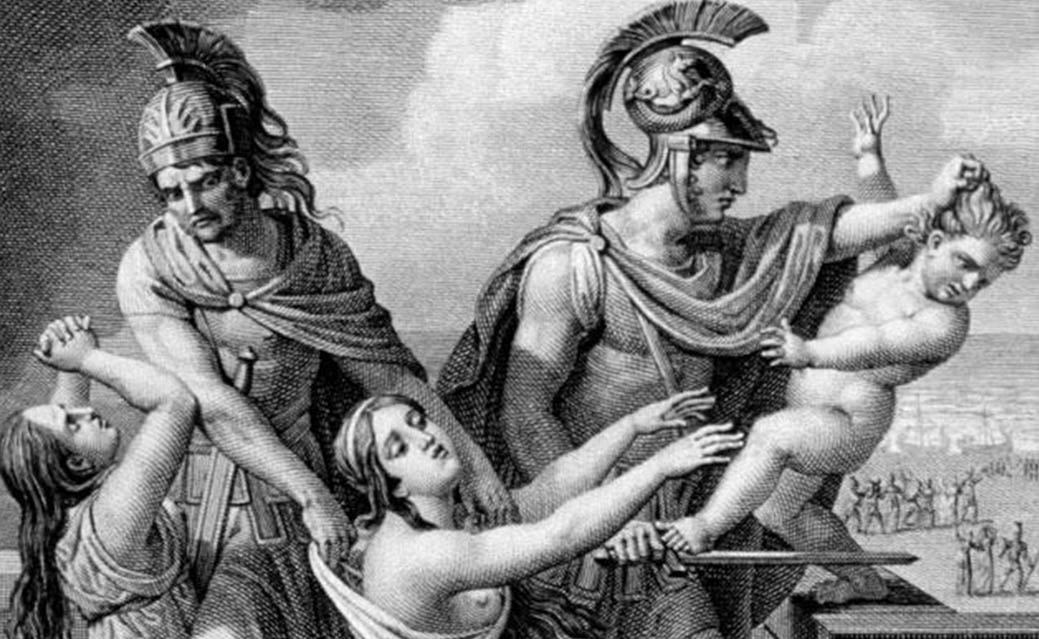Women in war: POL305Y’s performance of Trojan Women
The students’ show highlights the problems of the past and present.
“How wretched I am in this heavy fate which makes me lie here as I do, my limbs spread low, stretched out on my back on the ground’s hard bed,” says Hecuba in Euripides’ Trojan Women.
On February 16, the Department of Political Science and the Department of Classics at UTM held a joint event starring the students of POL305Y in a performative reading of Euripides’ ancient Greek play Trojan Women. The event was followed by a round table Q&A, which included Scottish award-winning director Victoria Beesley, Scottish-Syrian clinical psychologist Sana’a Al-Froukh, as well as UTM Professors Spyridon Kotsovilis and Martin Revermann.
The original play by Euripides follows the former Queen Hecuba and the other women of Troy as they lament the fate that awaits them. They are to be scattered throughout Greece as the slaves of the men who destroyed their city. The students worked for months, preparing sections of the original play and scenes from Beesley’s adaptation The Trojans, which covered the conflict in Syria. They also had the opportunity to attend rehearsal sessions with Beesley over Zoom, where she gave them deeper insight into the creation of her adaptation.
Following the live reading, the students and attendees took part in a discussion panel. Kicking off the panel was Beesley, who discussed her process in adapting the play and her experience working with the refugee actors in Scotland. She used her version of the play to expand the female suffering and trauma present in the original, creating an intersectional depiction of the refugee crisis that included race and nationality.
Following this was Al-Froukh’s discussion that emphasized the psychological effects of trauma and how productions like The Trojans helped those involved to heal. She talked about the extended stress response produced from being in a war zone and how the memories of this situation affect the brain. However, the exposure therapy provided by working on the play helped the refugee actors build something new. She also discussed the different ways women process trauma compared to men. Being more willing to seek out help and more attuned to their emotions, they are often able to heal quicker than their male counterparts. There is a cultural element to this as well, as women are often expected to be in tune with their emotions, as opposed to the stigma that men can face around mental health.
Professor Revermann then discussed the historical aspect. He noted the importance of a play’s “use value” asking what Trojan Women can do for us in modern-day society. Theatre works as an imaginative and emotional lab, allowing us to better process things. The original play, for example, shows an attempt by ancient Greek men to understand the plight of these women. Despite being written and performed by men, Trojan Women contains a moving attempt to understand female sorrow and upheaval. In the same way, the students could use this adaptation to better understand not only women but refugee women in the complex and nuanced Syrian conflict. This was a key part of the pedagogy of the project—it allowed students to put themselves in the shoes of these women, giving them a greater opportunity to understand the trauma portrayed in the play.
The final member of the panel was Professor Kotsovilis. His talk focused on the similarities between the Trojan War of antiquity and modern wars. Despite many developments over the centuries, one thing that has not changed is that war affects people of different genders in different ways. In the Trojan War, the women were left alone without their husbands in a time when that protection was vital to their survival and well-being. Today, women in wars are displaced, abused, sold into slavery, and otherwise used as pawns in conflicts. This aspect of Professor Kotsovilis’ discussion hit particularly hard, reminding us of how impactful stories like this remain, even 2500 years later.

